Editor’s note: This article includes social media comments that are vulgar and incendiary in nature. Please continue reading with discretion.
I spent part of the holidays at my friend’s pig farm.
He and his family raise 2,200 sows and have an impressive operation. I enjoyed learning more about it and even posted about it on social media. The caption was along the lines of how I enjoyed snuggling baby piglets and talked about all the care that goes into producing pork. This was the main image:
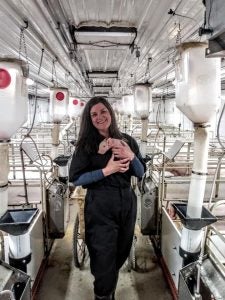
More than nine out of 10 Americans eat meat, including me. And bacon isn’t going anywhere, let’s be real.
It didn’t take long for the animal-rights activists to show up. This isn’t the first time this has happened to me, but this time the attacks were particularly extreme. I received comments and threats like this:
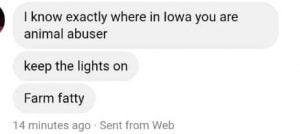
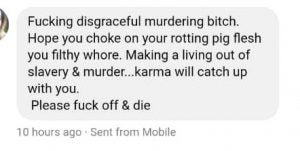



The post was shared across hundreds of vegan-activist groups, and I ended up having to delete it because it had nearly 9,000 angry comments. They came in droves, almost like they were fake, robotic spammy computer-generated comments. Comments also came in on random posts done years ago; the exact same comment was on multiple posts. It was bizarre, and I had never seen anything like it.
The weird thing is that my photo didn’t show anything graphic — just how pigs are cared for. I could understand if someone was physically hurting an animal … by all means, everyone should be up in arms and angry. No one wants to see animals abused, and the farm I posted about does a pretty good job with a solid science-based approach of taking care of animals. At the end of the day, any meat eater would tell you that it’s right to give the animal a good life and appreciate the sacrifice with a quick and humane ending.
Vegans don’t want us eating animals, we all get that. But what do their extreme efforts actually do? Well in addition to angry comments such as these, I responded with my thoughts:
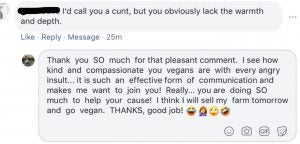
But really, this is what is so ironic: While animal-rights extremists claim to be so “compassionate,” “kind,” “caring,” etc., their words undercut that perception drastically. Do these comments come from people who seem kind and caring?



Hmm … I’m no communications expert, but I did have a sales career at one time. And a good sales person knows that people buy from whom they like. If you feel comfortable and trust your salesperson, you’re much more likely to buy into their product or ideology.
Same thing goes for any type of communication. Be nice. Are you really kind and compassionate? Then prove it by showing that kindness to fellow human beings. If there’s one thing I’m sure about, it’s that when these social media attacks happened, I ate meat that day. And the next day, and the next. Because with insults like that, why would anyone want to join their cause?
Some of my favorite people in the world don’t eat meat. I have vegan friends and followers. And they’re great! We are so fortunate to have a choice. We can disagree on certain topics, but if all these people want to do is show up with vile and vulgar comments, where is the dialogue? Many of my vegan friends are also embarrassed to be vegan though because they don’t want to be associated with PETA-type extremists. Personally, I ignore the hatred because I know it would only fuel their fire. (By the way, I am not a pig farmer, but we do grow soybeans, which makes the activists’ reactions that much more worthy of a facepalm.)
What the hatred did do on my page though is offer a great learning opportunity. Meat eaters and people who work in agriculture shared the post and allowed the “moveable middle” to learn a thing or two. The farming community came to my defense and supported the message. The angry comment section exposed who these people are and the awful things they say. It inspired me to want to speak out even more on how livestock are raised on farms, and it genuinely fuels my passion to keep going. Not only that, but I’m wondering if the activists know that because of them, I had a huge spike in engagement and got thousands more followers?
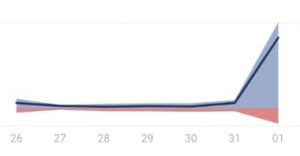
This screenshot image is just one example. Facebook algorithms give preference to engagement, and boy did that ever give me a boost! So in a way … I would like to thank them.
I would also like to take this opportunity to further turn this into a positive. I have a feeling I’ll be verbally attacked again, but the detractors might not read this article in its entirety. I would like to publicly announce that for every negative comment from animal-rights activists I receive on this article and post, I will donate $1 (maximum $1,000) to two charities I love that directly benefit the responsible use of animals — the Animal Agriculture Alliance and the National Animal Interest Alliance.
These two groups do great things to preserve purebred dog breeds, protect livestock farmers, and educate the public, protect and support zoos, hunting, and so much more. Check out their websites, and you, too, can donate to support their causes. Also, if there are any meat companies or others out there that would match my donation, please drop me a line.
To the people who came and commented negatively, to the people who said hurtful things: It did nothing but waste your time. It further shows the disconnect people have with our food system and inspires me to continue to tell the story of agriculture, encourage friendly dialogue, and help people learn more about where their food comes from.
Michelle Miller, the Farm Babe, is an Iowa-based farmer, public speaker, and writer, who lives and works with her boyfriend on their farm, which consists of row crops, beef cattle, and sheep. She believes education is key in bridging the gap between farmers and consumers.



